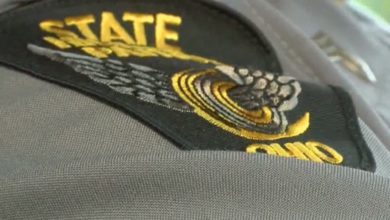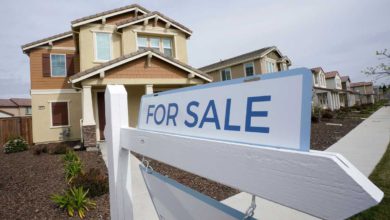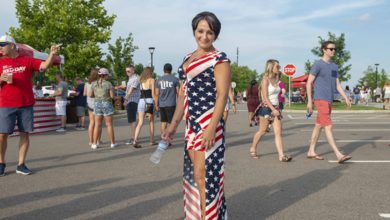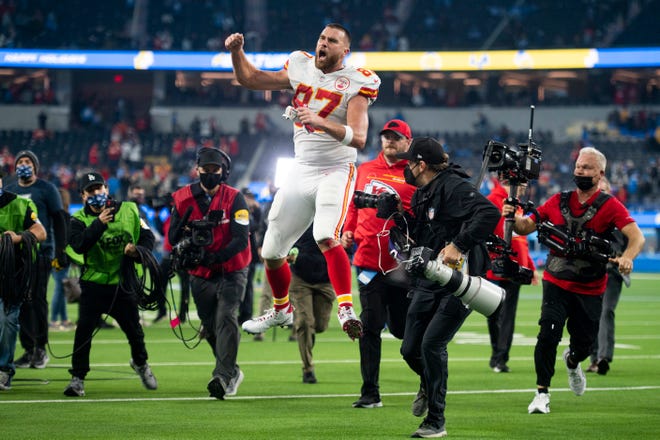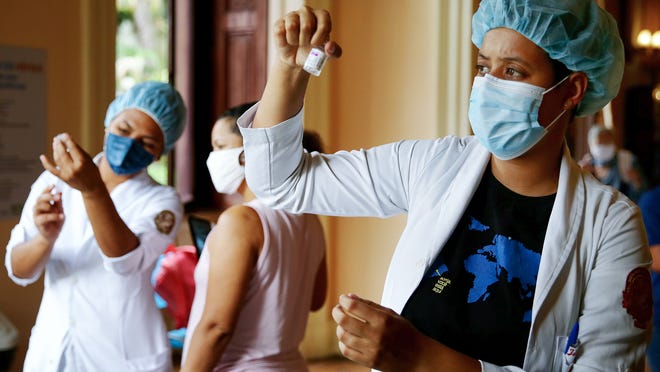
The concept of what "full vaccination" means – two doses of the Pfizer or Moderna vaccine or one of the Johnson & Johnson shot – is likely to change.
That’s the estimation of Dr. Anthony Fauci, who on Thursday presented data supporting booster shots during a briefing of the White House COVID-19 response team.
Asked whether another dose will be required, Fauci said the decision will be up to the Food and Drug Administration, but added, “I would not at all be surprised that the adequate full regimen for vaccination will likely be three doses.’’
The requirement of a third dose for “full vaccination’” would have broad implications for schools, businesses and other entities with vaccine mandates.
Fauci pointed to the results of a study of more than 1 million people in Israel that showed a “rather substantial positive impact’’ 12 days or more after they received a Pfizer booster shot amid spread of the delta variant. Data from the study show a reduction of more than tenfold in relative risk of both infection and severe disease after the booster, Fauci said.
The Biden administration said it will start providing booster shots Sept. 20 for people whose second dose was administered at least eight months before. The need for a J&J booster shot has not been determined yet but the CDC says it's likely.
“There’s no doubt from the dramatic data from the Israeli study that the boosts that are being now done there and contemplated here support very strongly the rationale for such an approach,’’ Fauci said.
Members of the COVID response team also said they’re monitoring the new mu variant, which the World Health Organization says has a “constellation of mutations’’ that could allow it to dodge vaccine immunity.
The variant has been detected in the U.S. but on a small scale, with the delta variant accounting for more than 99% of the sequenced infections.
“We’re paying attention to it, we take everything like that seriously,’’ Fauci said, “but we don’t consider it an immediate threat right now.’’
Also in the news:
►Seattle and King County in Washington state will reinstate outdoor mask mandates for events with 500 or more in attendance starting Tuesday, and encouraged people to wear masks in other outdoor settings when not 6 feet apart.
►Ontario, home to Toronto, is the fourth Canadian province to announce residents will have to show proof of vaccination against the coronavirus to enter restaurants, theaters, gyms and other indoor public venues. British Columbia, Quebec and Manitoba previously took similar measures.
►Washington Nationals Vice President Bob Boone has informed the club he’s resigning rather than comply with the organization’s COVID-19 vaccine mandate, the Associated Press reported.
►Superintendent Tom Wilson, of Anderson School District Five in South Carolina, announced Thursday a program to pay high school students $100 for vaccination proof. Now, some parents are calling for his ouster.
📈 Today's numbers: The U.S. has recorded more than 39.4 million confirmed COVID-19 cases and more than 642,000 deaths, according to Johns Hopkins University data. Global totals: More than 218.7 million cases and 4.54 million deaths. More than 174.6 million Americans – 52.6% of the population – have been fully vaccinated, according to the CDC.
📘 What we're reading: Parents, teachers and scientists are all trying to keep students safe as they return to the classroom. Here's a kid's guide to going back to school as the delta variant spreads.
Keep refreshing this page for the latest news. Want more? Sign up for USA TODAY's Coronavirus Watch newsletter to receive updates directly to your inbox and join our Facebook group.
A shot in the dark: Millions of Americans keep vaccination secret
The stigma of actually believing in vaccines is so powerful in some communities that millions of Americans are getting inoculated in secret to avoid reproach -- even though the shots have been proved safe and effective.
About 1 in 6 who are vaccinated against COVID-19 say they're keeping that information a secret from at least some people, while more than 1 in 17 aren't telling anyone, according to a Harris Poll survey conducted exclusively for USA TODAY. With more than 174 million being fully vaccinated in this country, that adds up to upward of 10 million declining to share that information.
In many cases, vaccinated people hide it because they know others in their life wouldn't approve.
“I was very uncomfortable with the idea of letting the supervisor know that I was going out to get a COVID shot,” said William, a manufacturing worker in Maine whose boss spread vaccine misinformation. “It does feel quite hostile.”
– Nathan Bomey
High vaccination rates protect ineligible children, CDC says
States with high COVID-19 vaccination rates are more successful at protecting children from the coronavirus, according to an analysis by the Centers for Disease Control and Prevention. Children under 12 are not yet eligible for the shots, but vaccination among adults and teens slows the spread of the virus in a community, making it less likely a child will catch it.
“Cases, emergency room visits and hospitalizations are much lower among children in communities with higher vaccination rates,” CDC Director Dr. Rochelle Walensky said.
In August, the hospitalization rate among children was nearly four times higher in states with the lowest vaccine coverage compared to states with high coverage, Walensky said.
The hospitalization rate in unvaccinated adolescents was nearly 10 times higher in July than among fully vaccinated adolescents, Walensky said, citing a second study. Both papers are set to be published Friday by the CDC.
Florida doctor advised parents to teach kids to lie about COVID, vaccine, then took it back
A Florida doctor has backtracked from Facebook comments in which he advised parents to teach their children to falsely say they've had COVID-19 and (those 12 and older) say they've been vaccinated so they can avoid getting quarantined and miss school if they come in contact with an infected person.
Dr. Jon Ward, a dermatologist in Panama City, said he changed the wording from his posting last weekend encouraging parents to have their kids lie to school nurses, saying in a statement to the Panama City News Herald:
"I regret making that statement. I posted as a frustrated parent who highly values education. My response was emotional and I realize that it was inappropriate and does not reflect the values of me, my family or my business.''
Bay District Schools Superintendent Bill Husfelt called Ward's advice to parents "absolutely reprehensible.''
– Tony Mixon, The News Herald
US reports more than a quarter of world's new cases
Recent jumps in American coronavirus case counts now have the U.S. accounting for more than a quarter of the world's new infections, a USA TODAY analysis of Johns Hopkins University data shows.
The country's share of the global cases leaped to 25.98% in the week ending Tuesday, up more than one percentage point from the day before. The U.S. is now reporting 14.4% of the world's COVID-19 deaths.
The U.S. has 4.22% of the world's population, according to Worldometer.
The nation hadn't represented more than a quarter of the world's cases since early February. In early July, the U.S. was reporting just 3% of the world's new cases.
– Mike Stucka, USA TODAY
Vaccines cut chances of long COVID in half, study shows
Fully vaccinated adults are at much lower risk of severe illness and hospitalization, including so-called long COVID, according to a new large-scale study that adds to the growing body of evidence of the vaccines' benefits.
It's also one of the first pieces of research that show vaccination is an effective tool against long-lasting COVID-19 symptoms. The odds of experiencing long COVID, or symptoms after 28 days of infection, dropped by 50% after two vaccine doses.
The study, published Wednesday in The Lancet Infectious Diseases journal, used data from more than 1.2 million partially and fully vaccinated adults in the U.K. from December 2020 to July 2021. Fourteen days or more after the first dose of the Pfizer-BioNTech, Oxford-AstraZeneca or Moderna vaccines, just 0.5% reported a breakthrough infection. After the second dose, that number dropped to fewer than 0.2%.
Among those who did have a breakthrough infection, the chance of being asymptomatic increased 63% after a first dose of the vaccine, and 94% after the second dose
“We are at a critical point in the pandemic as we see cases rising worldwide due to the delta variant,'' study co-lead author Dr. Claire Steves said. "Breakthrough infections are expected and don’t diminish the fact that these vaccines are doing exactly what they were designed to do – save lives and prevent serious illness."
-- Jeanine Santucci
Are cheap, accessible home coronavirus tests the delta antidote?
With labs in hot-spot communities once again scrambling to meet a spike in testing demand, advocates say rapid tests that don't require a lab can serve a crucial role as the delta variant sends case counts and hospitalizations higher.
Dr. Michael Mina, a Harvard epidemiologist, has long pushed for the federal government to purchase enough rapid antigen tests that most Americans could test two or three times a week. He argues that even though the tests are less sensitive than lab tests, they detect cases when people are infectious and most likely to infect others.
The hike in infections caused by the delta variant has prompted "renewed interest" in widespread testing, he said.
"People are realizing vaccines aren’t the silver bullet out of this," Mina said. "They are an absolutely crucial and important piece. But they were never going to be the thing that stopped the pandemic because we’ll have breakthroughs, variants and waning immunity." Read more here.
– Ken Alltucker, USA TODAY
Arizona adds $60M for health care staffing amid high hospitalizations
Arizona Gov. Doug Ducey announced $60 million for hospital staffing support to bring 750 additional nurses to the state for eight weeks, but only if they meet conditions including administering monoclonal antibody treatment to eligible patients systemwide and offering COVID-19 vaccinations to patients on discharge.
Hospitals are using monoclonal antibodies as an early intervention to keep high-risk patients with COVID-19 out of the hospital.
—Alison Steinbach, The Arizona Republic
Contributing: The Associated Press
Source link


